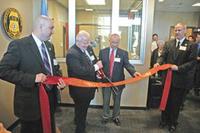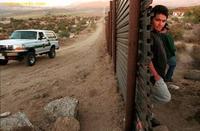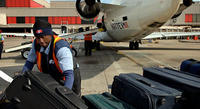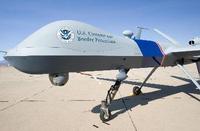-
ICE opens office in northern Michigan

The U.S. Immigration and Enforcement agency (ICE) recently opened a permanent facility in northern Michigan; the new ICE office will provide work space for agents conducting enforcement removal operations (ERO) and homeland security investigations (HSI); the 10,000 square-foot facility will include an evidence-processing room, modern offices, and a short-term holding cell; the facility will help ICE agents secure America’s northern border;a recent Government Accountability Report found that only thirty-two miles of the nearly 4,000 mile long northern border had “an acceptable level of security”
-
-
Officials battle over safe border claims

Last week during a visit to the U.S. Mexico border in El Paso, Texas, Homeland Security Secretary Janet Napolitano declared that the border is safer than ever; according to El Paso mayor John Cook, El Paso is the safest city of its size in the United States, despite sitting across Ciudad Juarez, Mexico, which has been hit hard by the bloody gang wars raging across Mexico; Napolitano’s remarks have generated sharp criticism from those who believe that the situation along the border has grown increasingly worse; in February, there were nearly 230 execution style killings in Ciudad Juarez and last December Brian Terry, a Border Patrol agent, was killed in the line of duty while deployed along the border
-
-
Eyeless in Libya -- and a Swiftian border security solution
Everyone knows what the Libyan rebels are against — Gaddafi — but there is no way tell what they are for; this lack of information is not good; first, the United States and its allies may be pushing for the replacement of the devil we know with the devil we do not know; this is akin to giving Michael Phelps a three body length advantage at a swim meet: not a good idea; second, the lack of knowledge about the rebels is like a Rorschach test: outsiders look at them and see what they want to see; Jonathan Swift suggests that impoverished Irish might ease their economic troubles by selling their children as food for rich gentlemen and ladies; should we consider a Swiftian solution to problem of securing the U.S.-Mexico border?
-
-
Report recommends abolishing fees for checked bags

A recent report by the U.S. Travel Association (USTA) found that airlines’ policy of charging for checked bags cost DHS additional money, increased wait times at airport checkpoints, and discouraged people from flying; the airport check-in fee and the additional hassles of flying have discouraged people from taking two to three trips a year resulting in the loss of roughly $85 billion in potential consumer spending; the report suggested that the Department of Transportation issue regulations that required airlines to allow passengers one checked bag at no additional charge; it also recommended the implementation of a trusted traveler program
-
-
Corruption in academic accreditation
Little-known colleges, most unaccredited, exploit Byzantine federal regulations, enrolling almost exclusively foreign students and charging them upward of $3,000 for a chance to work legally in the United States; they flourish in California and Virginia, where regulations are lax, and many of their practices are shoddy — for instance, holding some classes on only three weekends per semester; these colleges usher in thousands of foreign students and generate millions of dollars in profits because they have the power, bestowed by the U.S. government, to help students get visas
-
-
Sector Report for Thursday, 24 March 2011: Border / Immigration control
This report contains the following stories.
Plus 1 additional story.
-
-
U.S. works closely with Mexico to curb power of cartels
The United States is already involved in the spiraling violence which threatens to make Mexico into a failed state: hundreds of thousands of U.S.-made firearms are bought at U.S. gun shows and then smuggled into Mexico to arm the cartels; but there is another aspect to U.S. involvement: more and more American agents are operating in Mexico to stem the flow off drugs into the United States and curb the power of the cartels; U.S. agents generally provide intelligence and training, while Mexicans do the hands-on work; neither side will say exactly how many agents are in Mexico, citing security concerns
-
-
Congress plans to use credit rating to verify American workers
The federal government is exploring the possibility of using a credit rating giant like Equifax to verify the identity of American workers, a move that could make it far more difficult for undocumented immigrants to get work using stolen Social Security numbers
-
-
Border agent seizes student's laptop without warrant
On 1 May when a U.S. Customs and Border Protection agent stopped Pascal Abidor, an Islamic studies doctoral student at McGill University in Montreal, at Champlain, New York’s port of entry; the agent turned on Abidor’s computer and found a picture of a rally by the Hamas militant group, something he had downloaded from the Internet for schoolwork; Abidor’s life has not been the same since
-
-
Border agents intercept "destructive" Pakistani insects in Oakland
The Khapra beetle, which is native to India, can eat its way through up to 70 percent of grain stores to which it has access; it was eradicated in the United States in 1966, and has been subject to federal quarantine since then; U.S. border agents in the Port of Oakland discover — and destroy — the larva in a shipment from Pakistan
-
-
Mark Krikorian, executive director of the Center for Immigration Studies
Mark Krikorian, the executive director of the Center for Immigration Studies, was interviewed by Homeland Security NewsWire’s executive editor, Eugene Chow; Krikorian discusses the Obama administration’s immigration strategy, why mass migration is an outdated phenomenon, and what the government can do to enforce immigration laws effectively; “make E-Verify mandatory,” he says
-
-
DHS probes dancers for visas
It was a close call for the East Village theater La MaMa: At least three weeks’ worth of box-office revenue was on the line when DHS questioned the visa applications submitted by artists in an upcoming performance; although delayed by one week, the show will go on: The Irish Modern Dance Theatre’s “Fall and Recover,” a dance work inspired by survivors of torture, now opens Friday 25 March
-
-
E-Verify Self Check launched
DHS and U.S. Citizenship and Immigration Services (USCIS) announced the launch of E-Verify Self Check — a service that allows individuals in the United States to check their own employment eligibility status before formally seeking employment
-
-
Canada blasts DHS plan to impose a $5.50 border fee on Canadians
A $5.50 border fee proposed for the 2012 budget would net millions for the American coffers, funding security measures; DHS is calling for the change, and analysts predict the increase in collections could bring in up to $110 million dollars; Canadian Foreign Affairs officials have blasted the fee
-
-
U.S. UAVs track drug gangs in Mexico

The war in Mexico — between the drug cartels and the government, and among the drug cartels themselves — has been increasingly spilling across the border into the United States; some cartels now maintain outposts in the Arizona desert; to gather more information about the cartels, and to help the Mexican authorities in their war against them, the United States has been flying unarmed surveillance UAVs over Mexico; the flights are made in coordination with and at the request of the Mexican government; the Mexican authorities also choose the target of drone surveillance; drones had gathered intelligence that led to the arrest in Mexico of several suspects in connection with the murder of a U.S. immigration agent, Jaime Zapata
-
- All
- Regional
- Water
- Biometrics
- Borders/Immig
- Business
- Cybersecurity
- Detection
- Disasters
- Government
- Infrastructure
- International
- Public health
- Public Safety
- Communication interoperabillity
- Emergency services
- Emergency medical services
- Fire
- First response
- IEDs
- Law Enforcement
- Law Enforcement Technology
- Military technology
- Nonlethal weapons
- Nuclear weapons
- Personal protection equipment
- Police
- Notification /alert systems
- Situational awareness
- Weapons systems
- Sci-Tech
- Sector Reports
- Surveillance
- Transportation
Advertising & Marketing: advertise@newswirepubs.com
Editorial: editor@newswirepubs.com
General: info@newswirepubs.com
2010-2011 © News Wire Publications, LLC News Wire Publications, LLC
220 Old Country Road | Suite 200 | Mineola | New York | 11501
Permissions and Policies
Editorial: editor@newswirepubs.com
General: info@newswirepubs.com
2010-2011 © News Wire Publications, LLC News Wire Publications, LLC
220 Old Country Road | Suite 200 | Mineola | New York | 11501
Permissions and Policies
